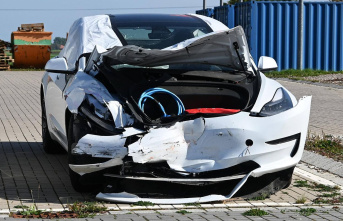This is a real race against the clock. The meetings have increased between european leaders on Sunday, July 19, 2020 in Brussels, in the hope of avoiding a failure in the negotiation of the recovery plan post-coronavirus, which has revealed significant divisions between States. On the third day of a summit expected to last up to two, after more than 55 hours of meetings, discussions to 27, several times repulsed, were resumed over dinner at 19: 20 (17: 20 GMT).
The president of the european Council, Charles Michel, mediator of the summit, has multiplied throughout the day during the meetings in the head-to-head or in small groups, most often on the balcony of his office where a long table has been installed and pictures have marked the social networks. In the late afternoon, the First belgian minister Sophie Wilmès, received at the table of Michel with his counterparts in luxembourg and ireland, asserted his determination : "the time for an agreement is coming ".
Read also european recovery Plan : a gesture in the direction of the frugal
following The summit, the longest of the leaders of the EU from that of Nice in 2000 on a revision of the treaties in the context of enlargement to the East (four days and four nights), remained very uncertain. Things " moving slowly ", said a source european. The Luxembourg Xavier Bettel, regular summits for the past seven years, confessed to having " rarely seen positions as diametrically opposed, on many points ". On the table of negotiations, a fund established by a borrowing capacity of € 750 billion to revive the european economy, which is facing an historic recession, backed by the long-term budget of the EU (2021-2027) 1 074 billion euros.
Recovery and the rule of law
The latest discussions have focused on the portion of the stimulus funds that will be devoted to grants, compared to what would be paid to the Member in the form of a loan (and thus repayable). The so-called "frugal" (the netherlands, Austria, Sweden, Denmark, which combines Finland) relates to loans and advocating a decrease in the overall volume of the plan. The unanimity required of the 27 member States, makes agreement particularly difficult. To the extent that it is not the only point of friction.
Among these, the link between the payment of aid and the respect of the rule of law, that cringe especially Budapest and Warsaw, currently in the sights of the EU. The Hungarian Prime minister Viktor Orban strongly opposed to this type of measuring Sunday morning at a press briefing. He accused his Dutch colleague of wanting to " punish him financially ", and "hate" him and Hungary. This type of measure could penalise the government's nationalist and increasingly authoritarian rule of Orban if his peers feel that his alleged attack against the free media and democratic standards is at odds with european values.
Read also recovery Plan : Kurz loose ballast, Rutte is under pressure
Balance grants/loans
Regarding grants, France and Germany are interested in a substantial part of the recovery budget is devoted, in the spirit of the fund of 500 billion they had proposed in mid-may. And they argue that the amount allocated for direct support to the plans of national reform is of 325 billion euros, as in the last proposal, according to european sources. The frugal have, meanwhile, proposed a perfect balance between the two, according to the sources. "We're looking for a compromise between 350 and 400," said a source at the Agency France-Presse.
German chancellor Angela Merkel had opened the day with a warning that it was " possible that no result will be obtained ", while the French president Emmanuel Macron warned that the "compromise" could not do " for the price of european ambition ". Angela Merkel and Emmanuel Macron weighed all their weight to persuade the " frugal ". The lines of fracture were marked. In a tweet, the head of the Italian government Giuseppe Conte was opposed to " the vast majority of countries ", including Germany, France, Spain and Italy, " who defend the european institutions and the european project ", and " some countries, so-called "frugal" ".
also Read "Merkel is passed to an output from the bottom output from the top"
on The second day of discussion, under high voltage, was completed in the night from Saturday to Sunday on a meeting " very hard ", according to several sources, between the French president, the German chancellor and the leaders of the four "frugal" and Finland. To try to coax the Netherlands Mark Rutte, particularly reserved on the recovery package and which called unanimously for the validation of the plans of the national reform demanded in return for european aid, Charles Michel proposed a mechanism allowing a country that would have reservations open up a debate to 27. Such a configuration would equate to the de facto veto right for each capital city. This demand concerned Rome and Madrid, who fear they may be subject to a programme of reforms (labour market, pensions...) imposed.
Consult our folder : Coronavirus : the world stop








